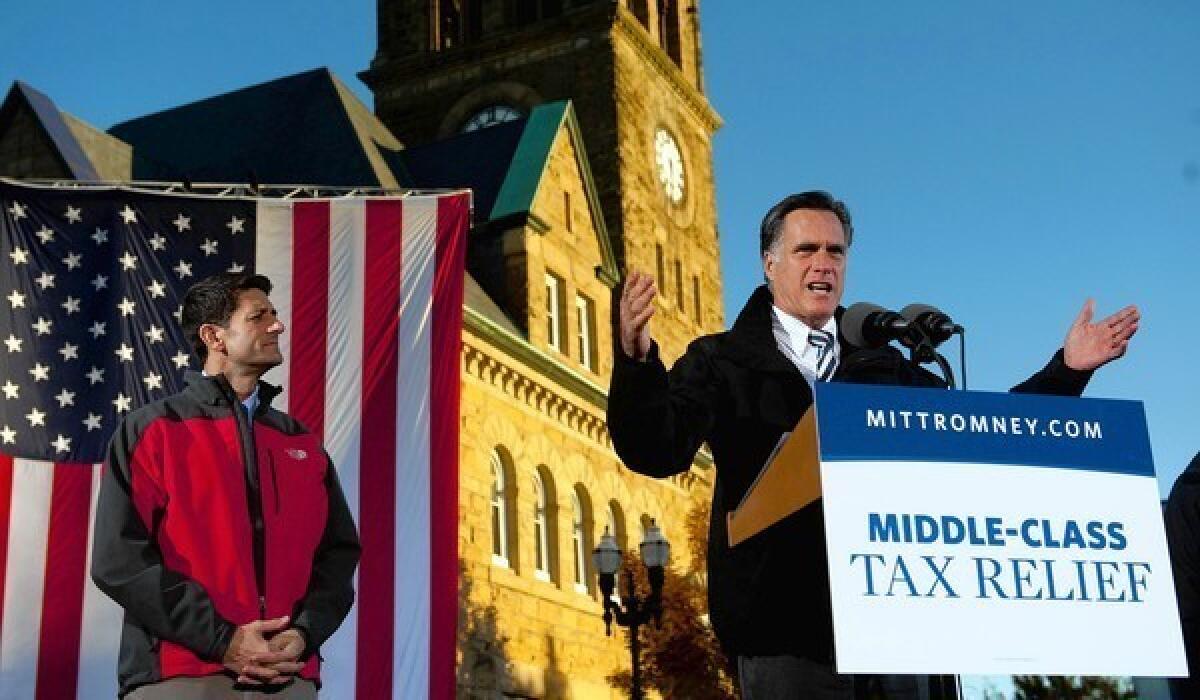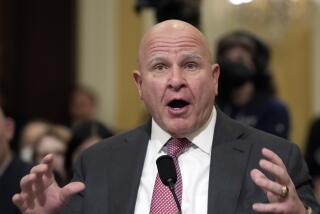Romney distances himself from Bush-era neoconservatives

- Share via
WASHINGTON — As he seeks to appeal more to moderates, Mitt Romney is putting new distance between his campaign and some prominent Republican allies who are pressing him to adopt the rousing but politically risky foreign policy principles of former President George W. Bush.
The battle to set Romney’s foreign policy has raged all year inside his presidential campaign, but has intensified in recent weeks as Republicans have sensed a political opportunity in the Obama administration’s shifting characterizations of the terrorist attack that killed four Americans at the U.S. diplomatic mission in Benghazi, Libya.
A senior Republican strategist close to the campaign said Romney was groping for a “version 2.0” of the foreign policy of the Bush era, but one that would more resemble President Reagan’s in the Cold War. It would seek to assert American leadership and values with a powerful military and bold rhetoric, but “with a more cautious view of where and when we use force.”
The imperative is to avoid “the mistakes and miscalculations of the last decade,” said the strategist, who spoke on the condition of anonymity to speak about internal deliberations. “The Bush foreign policy is a terrible brand.”
Occasionally, Romney openly evokes Reagan-era rhetoric. Last March, for instance, in a CNN interview, he called Russia the United States’ “No. 1 geopolitical foe.”
With foreign policy questions expected when the GOP nominee meets President Obama on Tuesday in their second debate, neoconservatives on Romney’s policy team and in influential Washington circles are urging him to state clearly how and when he would use U.S. military power against adversaries, especially in the volatile post-revolutionary Middle East.
Before Romney delivered what his aides billed as a major foreign policy speech at Virginia Military Institute on Oct. 8, for example, hawks urged him to show he would be more forceful than Obama in responding to global challenges from Iran to China. Some lamented his lack of specificity to date.
Danielle Pletka, a vice president of the conservative American Enterprise Institute think tank in Washington, noted that Romney himself had called for a new Mideast policy. “Damn right,” she wrote in a blog. “What is it?”
But Romney also reached out before the speech to the party’s most eminent “realists,” the ideological rivals of the neoconservatives. He spoke by phone with former secretaries of State Henry Kissinger, James A. Baker III and George Shultz, as well as Bush’s top diplomat, Condoleezza Rice, and national security advisor, Stephen J. Hadley.
In the end, Romney carefully avoided any direct warnings or aggressive language to suggest he intends to draw America into a new military conflict, a deeply unpopular notion after the two wars started by Bush.
Romney doesn’t have a single dominating figure who oversees his foreign agenda, relying instead on a group of about 200 outside advisors, campaign staff and other experts. About two-thirds are veterans of the Bush administration.
Among them are several prominent neoconservatives and defense hawks, including Elliott Abrams, Bush’s deputy national security aide; Elizabeth Cheney, a former Bush State Department official and the daughter of former Vice President Dick Cheney; Dan Senor, former spokesman for the U.S. occupation forces in Iraq; John R. Bolton, Bush’s ambassador to the United Nations; and Robert Kagan, a Reagan administration aide and conservative intellectual.
His inner circle confers in a Monday morning conference call. In addition to Cheney and Senor, those on the line include Richard Williamson, a Reagan and Bush aide; Mitchell Reiss, a former aide to Secretary of State Colin L. Powell; and former Sens. Jim Talent of Missouri and Norm Coleman of Minnesota.
On the campaign trail, Romney has called for promoting traditional American values overseas in phrases that hint of Bush’s “freedom agenda,” a policy that sought to bring democracy to dictatorships around the world — by force if necessary.
But when the rhetoric is cut away, Romney’s approach more closely resembles Obama’s in most current hot spots. They both are reluctant to provide direct military support to the rebels battling President Bashar Assad in Syria, for example, and both refuse to say precisely what Iranian nuclear action would trigger a U.S. military response.
In public events, Romney has repeatedly claimed he would prevent Iran from acquiring nuclear weapons know-how. He has criticized Obama for vowing only to stop Iran from building a bomb, which could come much later, a policy that Romney says suggests weakness.
But Romney’s position is far from clear. He told an ABC-TV interview twice last month that his “red line” in Iran was the same as Obama’s. And he told reporters that he believed the standoff with Tehran could be settled without force, a claim that echoed the White House position.
And while Romney argues that Obama has botched his handling of the “Arab Spring” revolutions, the Republican has not said that he would seek to block the rise of elected Islamist governments, or to cut off their military and economic aid, as some supporters have demanded in the case of Egypt.
“There may be some tactical steps along the way where we have to deal with these groups,” an advisor said, speaking on the condition of anonymity to discuss the internal workings of the campaign.
Behind the scenes, the neoconservatives and “realists” have been quietly maneuvering to be heard, and some complain that Romney has ignored their policy papers in a process they consider opaque.
At times, however, the scuffling has emerged in public.
When Romney named Robert Zoellick, a moderate who was deputy secretary of State and trade representative under Bush, to head a White House transition team, Bolton and his allies exploded in protest. But Zoellick has stayed.
In August, Williamson told a Brookings Institution audience in Washington that Romney favored arming the Syrian insurgents. He soon had to backtrack and acknowledge that Romney favored helping Arab allies supply arms to trustworthy rebel groups, much as the Obama administration is doing.
In July, when Romney visited Israel, Senor said that the candidate would “respect” an Israeli attack on Iran, suggesting Romney would support such a move. But Senor also was forced to ratchet back the rhetoric, later saying that Romney “recognizes Israel’s right of self-defense,” the phrase used by the Obama administration and previous administrations.
For now, the Romney campaign acknowledges the internal policy debates, but calls it a healthy give and take that shows Romney, in the end, will call his own shots if elected to the White House.
“The idea that Romney is following the George W. Bush approach is a caricature the Democrats want to draw,” the advisor said. “We’re not going to help them with that.”
More to Read
Get the L.A. Times Politics newsletter
Deeply reported insights into legislation, politics and policy from Sacramento, Washington and beyond. In your inbox twice per week.
You may occasionally receive promotional content from the Los Angeles Times.











